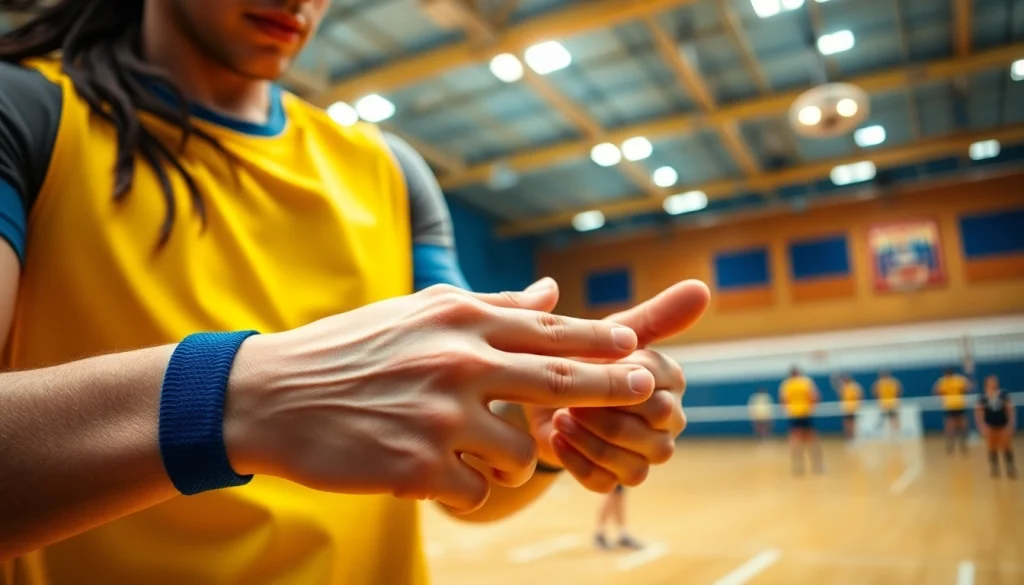Understanding the Need for Volleyball Thumb Taping
Volleyball, a dynamic and fast-paced sport, places immense strain on the hands, particularly the thumbs. For athletes engaged in this high-impact game, the risk of thumb injuries is prevalent due to repeated impacts and awkward angles during play. Taping the thumb has become a common practice among volleyball players not only to provide support but also to prevent injuries from escalating. In this guide, we will delve into the importance of volleyball thumb taping, explore the types of injuries that may occur, and outline effective techniques to ensure optimal thumb health.
Why Volleyball Players Tape Their Thumbs
Taping offers several benefits for volleyball players. Primarily, it provides compression and support, stabilizing the thumb joint during vigorous movements. This stabilization is crucial when spiking, blocking, or receiving the ball, where improper strain can lead to sprains or fractures. Furthermore, tape can help alleviate pain from existing injuries by limiting the motion of the thumb, allowing athletes to continue playing while minimizing discomfort.
Common Thumb Injuries in Volleyball
Among the common injuries volleyball players face, thumb sprains are particularly prevalent. These injuries often occur when the thumb gets caught during a play or collides with another player or the ball. Other injuries may include ligament tears and tendonitis, which can be exacerbated without proper support. The symptoms of these injuries typically manifest as pain, swelling, and reduced range of motion, making timely intervention through taping crucial for recovery and continued participation in the sport.
Benefits of Proper Thumb Support
- Injury Prevention: Taping helps to prevent the thumb from hyperextending or twisting in ways that could lead to injuries.
- Pain Relief: Compression from the tape can reduce inflammation and pain associated with existing injuries.
- Improved Performance: By providing support, players can focus more on their performance rather than worrying about potential injuries.
- Enhanced Confidence: Knowing that your thumb is secured can enhance an athlete’s confidence when making plays.
Step-by-Step Guide to Volleyball Thumb Taping
Essential Materials for Effective Taping
Having the right materials is key to effective taping. Athletes should equip themselves with:
- Athletic tape (preferably elastic or kinesiology tape for flexibility).
- Scissors for cutting the tape to desired lengths.
- Adhesive spray, if preferred, to enhance tape adhesion.
- A towel or cloth for prepping the thumb and surrounding area.
Prepping the Thumb Before Taping
Preparation is essential for a successful taping job. Start by cleaning the thumb and surrounding area to remove any moisture or oils. This can improve the tape’s adherence. If desired, a small amount of adhesive spray can be applied to create a better grip for the tape. Make sure that the thumb is in a neutral position and ready for taping.
Advanced Taping Techniques for Maximum Support
For optimal support, advanced taping techniques can be employed. One effective method involves the following steps:
- Begin with a base anchor strip around the wrist, ensuring it is secured firmly.
- Wrap a piece of tape around the thumb, starting below the knuckle and going around the base of the thumb in a figure-eight pattern, which provides stability.
- Secure the tape by attaching it back to the wrist anchor, ensuring that the thumb remains in a slightly bent position.
- Finish by wrapping additional pieces as needed for extra support, focusing on areas where previous injuries have occurred.
Best Practices for Maintaining Thumb Health
Stretching and Strengthening Exercises
Maintaining thumb health goes beyond just taping; it requires consistent exercise to strengthen the muscles surrounding the thumb. Simple exercises like thumb bends, finger spreads, and resistance band pulls can significantly improve flexibility and strength in the thumb and hand, reducing the risk of injury.
Recognizing Signs of Injury or Strain
Understanding when to take a break is essential for recovery. Common signs of thumb strain include persistent pain, swelling, or difficulty in gripping objects. Athletes should monitor these symptoms closely and adjust their training or seek professional help when necessary to avoid worsening an injury.
When to Seek Professional Help
If pain persists despite using taping methods, it is advisable to consult a healthcare professional. Persistent swelling, bruising, or inability to move the thumb may indicate a more serious injury that could require medical intervention. Early diagnosis and treatment can prevent long-term issues and ensure a quicker return to the sport.
Real-World Examples of Successful Taping Techniques
Case Study: Professional Volleyball Players and Their Taping Rituals
Many professional volleyball players have their unique taping rituals that they follow before matches. For example, several players in the national leagues rely heavily on kinesiology tape to stabilize their thumbs. Coaches emphasize the importance of routine taping in their pre-game preparations, helping players reduce downtime from injuries.
Testimonials from Amateur Athletes on Taping Efficacy
Amateur players also report significant improvements in their game due to the implementation of proper thumb taping. Testimonials highlight increased confidence when executing spikes or blocks, with many players attributing their ability to continue playing despite injuries to effective thumb support techniques.
Video Tutorials for Visual Learners
For visual learners, numerous online resources provide detailed video tutorials demonstrating how to tape a thumb effectively. These resources offer step-by-step instructions, making it easier for athletes to learn proper techniques at their own pace.
Future Trends in Sports Taping Techniques and Materials
Innovations in Athletic Taping Products for 2025
The sports industry is continually evolving, with innovations in taping materials expected for 2025. Emerging technologies are likely to introduce lighter, more breathable fabrics that enhance mobility while providing adequate support. Furthermore, biofeedback sensors integrated into tapes could help players monitor their thumb movements and adjust their support needs in real-time.
How Technology is Enhancing Sports Injury Prevention
Advancements in sports sciences and technology are making it easier to prevent injuries through tailored taping solutions. Sports scientists are exploring how different taping techniques can be combined with wearable technology to track performance data, potentially minimizing injury risks before they occur.
Predictions for Evolving Taping Practices in High-Performance Sports
As understanding of biomechanics and injuries improves, we can expect to see more personalized taping strategies being developed for athletes. This customization will likely be informed by an athlete’s specific movements and injury history, allowing for more effective injury prevention strategies tailored to individual needs in high-performance sports.




